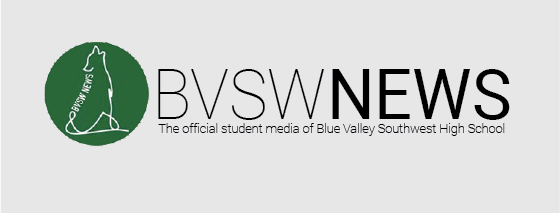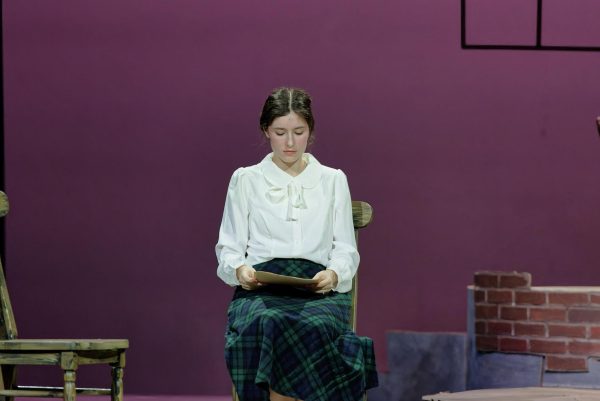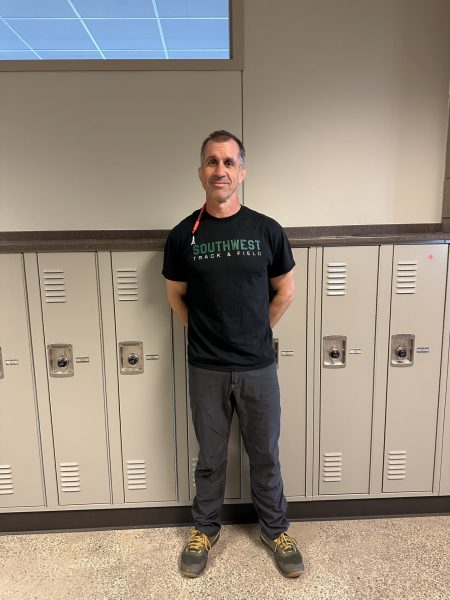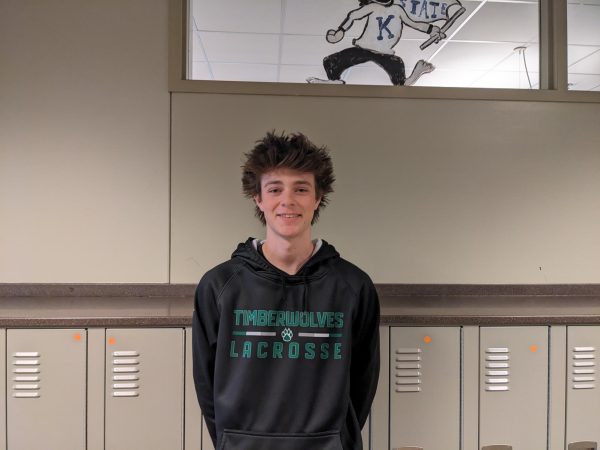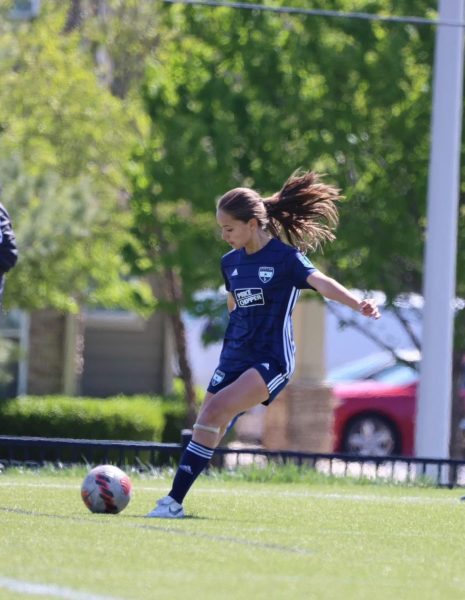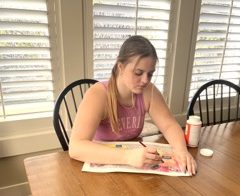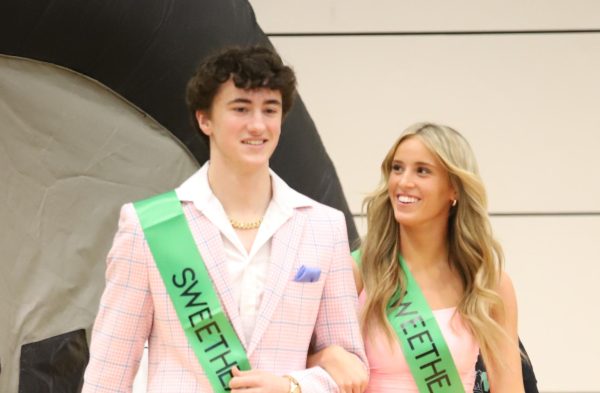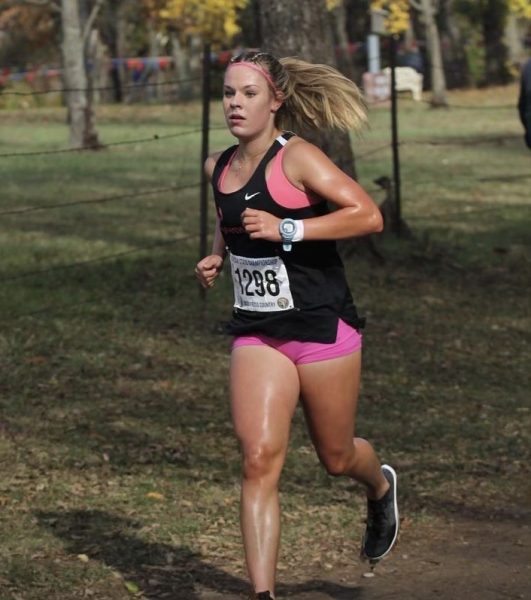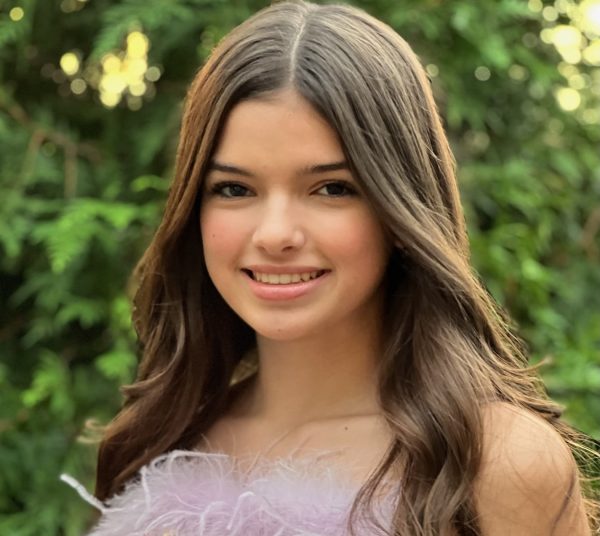Students share their stories of coming out

If senior Alex Peuser walked through the halls and saw something he disagreed with, he would not be the person to just stand there and watch. He would be the person to change what was happening. And he attributes this fact to being comfortable with who he is.
“I look at what people do to themselves to try to fit in because that’s what they think they should do … it’s hard to watch sometimes,” he said. “I’m happier than I’ve probably ever been, because I know what I want and I know how I’m going to get that and I know who I am.”
Alex believes “knowing who you are and knowing what you want will make you happiest.” For him, this involved becoming open in his sexuality, first with himself and then with the rest of the world.
Freshman year is really interesting for everyone, Alex said, because that’s when “you learn what you want from life – the route that you’re going.” When his friends started what he called their “awkward freshman relationships,” Alex would give advice, but he was never in a relationship himself because he never wanted one. It was then that he started to question himself.
I’m not gay, he would tell himself. There will be a girl, and I will really like that girl. I just haven’t found that girl that I really like. But eventually, he realized this wasn’t the case.
“For me, coming out meant coming out to myself,” Alex said. “I had to accept it first. Anyone who knows me well would say that I am very comfortable in my own skin, which is very true. But at the same time, being gay was something I was not comfortable with for a long time. [The] reassurance [from my support system] allowed me to really question whether or not I wanted to continue hating myself for something I could not change, or if I was willing accept me for me. I did choose to accept myself on the principle that it was society who shaped me to hate myself, because being gay is something that is different and misrepresented.”
According to pewsocialtrends.org, a majority of the members of the LGBT population says most of the people who are important to them know about this part of their life.
The day Alex decided to tell someone, he asked for an acquaintance’s phone number and texted the same day “what is your opinion on [being gay in general]?” He said the friend responded with something along the lines of “it’s okay, you don’t have to tell me now … I know.”
But while it went well for him, Alex said he is grateful that he wasn’t turned away from his friends like so many other people.
“That’s the biggest thing people don’t understand,” he said. “Yes, this person is gay, but they’re still the same person they’ve always been. They just told you something that you didn’t always know.”
Junior Molly Sharp was not as lucky at first. Her best friend was completely fine with finding out Molly was pansexual in seventh grade — when it was private. But as soon as Sharp became more open, the friendship crumbled.
“She stopped talking to me because she didn’t want people to think that we were together,” Sharp said. “Do you like every guy you see? No. I’m not going to like every girl I see.”
Instead, Sharp said that if somebody just comes out, don’t attack him or her with questions, because that’s a little intrusive, and don’t act different around him or her.
“It’s nice to know that there are people who are open,” she said. “I know that a lot of people struggle with coming out because people are so judgmental, and to know that there are people out is nice — that people aren’t scared to come out.”
In September 2010, journalist Dan Savage and his husband Terry Miller made a YouTube video in response to the number of kids taking their own lives after bullying at school. The video sparked a worldwide movement known as the It Gets Better project, where over 50,000 videos of students, friends and celebrities were created, telling LGBT youth that it does get better. Alex used to spend hours at night watching them.
“I try to be a very put together person, and showing emotion is something I don’t do often, but I remember watching those videos and just crying,” Alex said. “And it wasn’t because it was of sad things. There were people out there who were just like me, and they still ended up being great human beings, and they still are, and that was probably the biggest reassuring thing — that it wasn’t just me.”
Senior Emmalee Herrick also shared her story online. One night while she was on Facebook, Herrick scrolled through her news feed to see extended family members creating anti-gay posts.
“My mom, my dad and I are kind of like the blue dot in our big red family,” Herrick said. “And so I see all this stuff on Facebook, and I was just done with it. And so I just went on this huge Facebook rant about people who were just bashing on the LGBT community.”
In response, Emmalee decided to make her own Facebook post. The last line was “You know what, I’m gay, and I am certainly going to stick up for MY RIGHTS, not matter what you think.”
Herrick said she “didn’t grow two feet taller” and her hair didn’t “suddenly turn rainbow color.” Instead, she woke up the next morning and nothing had changed.
“People will judge you no matter what you do,” Herrick said. “They’ll judge you on the clothes you wear; they’ll judge on what you say, how you look. And as long as you don’t let them affect you and let them get inside your head, you just kind of have to be strong in who you are. Because I know it’s hard to figure out who you are in high school and that’s the most difficult thing. High school’s pretty mean if you let it get the best of you.”
During Alex’s sophomore year, the theatre department performed the Laramie Project, a play based on the true story of college student Matthew Shepard who was brutally murdered for being gay. Alex played Jonas Slonaker, a middle-aged man who was outspoken about the tragedy and called for change, and Harry Woods, just slightly older, who was very surprised with the community and its ability to come together. Both men were gay.
“The entire cast knew [I was gay] — whether they were okay with it or not, it didn’t matter,” Alex said. “[When performing I thought], ‘I can say this as a character and I can be fine.’ And when I saw the feedback people got from the school, it was just eye-opening to see that it didn’t matter that much. It was just easier to come out to the rest of the school.”
Spring semester. Alex sat with his mom, Elizabeth Peuser, in the car after a three hour play rehearsal. He began to tell her about his friend who had left home and was now missing. She recently told her parents she was a lesbian, he said, and they basically disowned her as their child.
“I can’t even imagine how a parent can love their child for 17 years, and then just because their child is gay they no longer love her,” Elizabeth responded.
She asked if he knew any other students who were gay. Alex listed off a few names, one by one. “And me of course. I think you knew that already.”
“I think the hardest [part] would have been coming out to my family,” Alex said. “It was only hard because these are the people who are supposed to love you no matter what; these are the people who gave you the life you have, and want to see all of the milestones you hit along the way — coming out or being gay generally isn’t a milestone that most parents sketch into this plan. However, I can say that for as scary as it was, I always knew that my family would be supportive. In fact, if you asked my parents, they would say they knew the entire time; they were just letting me figure this one out on my own.”
Pewsocialtrends.org says that 59 percent of people who have told their mother about their sexual orientation or gender identity say it was difficult to share this information. However, of this group, the vast majority say it either made the relationship stronger (39 percent) or didn’t change the relationship (46 percent). Elizabeth wouldn’t say she was surprised to find out.
“I think I was a little sad knowing that he had lots of challenges ahead of him in life, as our society is not all acceptant of individuals that are gay,” Elizabeth said. “No parent wants to see their child face the evils of the world. [But] I am no longer sad for Alex. He is so strong and independent. He knows what he wants in life, and he will not let anything get in his way.”
Back in first grade, Alex once chose to work in a group with three girls, which caused some boys to walk over and make some comments, “basically [calling] him a girl.”
But in the parent-teacher conference later, Alex’s teacher told Elizabeth that she was so proud of him for saying he didn’t care what they thought and that the girls were his friends.
Alex said he always knew he was different, but he didn’t have a word to describe it. He “was not exposed to gay and what gay meant as a child, and therefore [he] did not fully understand it.”
When guidance counselor and Gay-Straight Alliance sponsor Kevin Halfmann was in high school, nobody talked about being gay. Yet he later found out that several of his classmates were gay — including a good friend.
“Society kind of says that you’re not supposed to be different,” Halfmann said. “You’re not supposed to be different in all sorts of ways. We’re all supposed to dress a certain way, act a certain way … so whenever we’re divergent from the group, it’s a little bit of a challenge.”
Halfmann says that humans respond to things on both an intellectual and emotional level. This means that even if a person has always been supportive of gay rights, he or she could still be taken back to find out a friend or family member is gay — he or she might just need time.
“I think ultimately, it comes down to this — that whether it’s right or wrong or you’re born that way or not born that way, whatever you believe — it’s still not okay to hurt other people,” he said.
Words from others can hurt, but Alex also said it’s hard to watch people hurt themselves. He wishes he could tell people “you should stop getting in your head about what everyone thinks about you, because everyone’s thinking the same thing: they’re thinking about what other people are thinking of them.”
“As high schoolers, we get so caught up with what others think of us,” he said. “If we would just get out of our heads for a second and stop analyzing what people thought of us, we could all be so happy. We need to remember that what happens in high school and the perceptions that may follow us are not the end of the world.”
Looking back, Alex wishes he had realized a year sooner that being comfortable with yourself is the easiest way to make it through high school. Maybe now he’ll make his own videos for the It Gets Better Project, because he wants people to know that it does get better, and that they’re not alone.
“It’s not just you,” Alex said. “I think that needs to be more of a global statement, because not everyone can relate to being gay, but everyone can relate to being different.”
Statistics:
* 75 percent of LGBT youth says that most of its peers do not have a problem with its identity as LGBT
* 95 percent of youth supported expanding hate crimes to cover gender identity and sexual orientation
* 16 is the average age for gay or lesbian youth to come out
* 64 percent of LGBT youth say it is out to its classmates
statistics courtesy of www.wcadv.org and pewsocialtrends.org.
*National Coming Out Day on Oct. 11
Celebrating coming out as lesbian, gay, bisexual, transgender or as an ally.
*The Day Of Silence on April 11
Stay silent the entire day to call attention to the silencing effect of anti-LGBT bullying and harassment in schools.
*Join GSA in room 703
The Gay-Straight Alliance meets Thursday mornings at 8:15.
What to do if you need help
*The It Gets Better Project at itgetsbetter.org
Mission: to communicate to LGBT youth around the world that it gets better, and to create and inspire the changes needed to make it better for them.
Crisis intervention and suicide prevention for LGBTQ youth through call, chat, or text. Online at thetrevorproject.org.
*LGBT National Help Center Hotline at 888-843-4464
Free and confidential telephone and internet peer-counseling, information and local resources for LGBTQ callers throughout the United States.
LGBTQA
Lesbian: A homosexual woman.
Gay: A homosexual person, usually used to describe men but may be used to describe women as well.
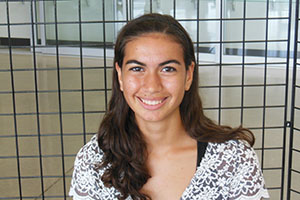
2014 marks Ananda Bhatia's third year in newspaper and first year as editor-in-chief. She is incredibly excited to work with such a talented and hard-working...
